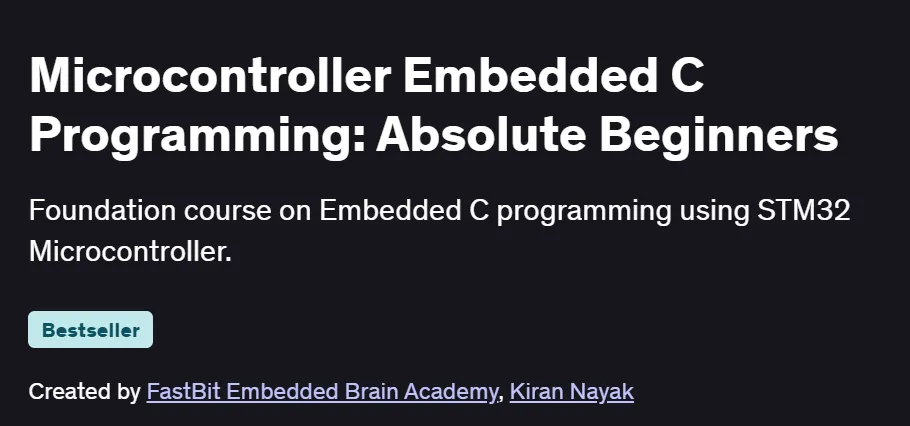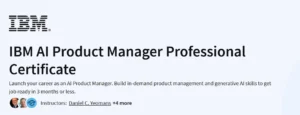Microcontroller Embedded C Programming: Absolute Beginners
A thorough, project-driven Embedded C course that empowers you to build real-world microcontroller applications with confidence.
What will you in Microcontroller Embedded C Programming: Absolute Beginners Course
- Write, compile, and debug Embedded C code for microcontrollers.
- Interface GPIO pins for digital input/output and sensor integration.
- Configure and utilize timers, counters, and delay routines.
- Implement analog-to-digital (ADC) and pulse-width modulation (PWM) functionalities.
- Establish serial communication over UART, I²C, and SPI protocols.
- Handle external and peripheral interrupts to build responsive systems.
Program Overview
Module 1: Introduction to Embedded C & Toolchain Setup
⏳ 30 minutes
Install and configure your IDE, compiler, and programmer/debugger.
Understand the difference between desktop C and Embedded C.
Module 2: Microcontroller Architecture & GPIO
⏳ 1 hour
Explore MCU core components: CPU, memory, and peripherals.
Configure GPIO pins for input, output, and pull-up/down modes.
Module 3: Timers, Counters & Delays
⏳ 1 hour
Set up hardware timers for event counting and time-base generation.
Create accurate delay functions without busy-waiting.
Module 4: Analog-to-Digital Conversion (ADC)
⏳ 45 minutes
Configure ADC channels and sample rates.
Read sensor voltages and convert to digital values.
Module 5: Pulse-Width Modulation (PWM)
⏳ 45 minutes
Generate PWM signals to control LEDs, motors, and servo positions.
Adjust duty cycle and frequency dynamically in code.
Module 6: UART Serial Communication
⏳ 1 hour
Initialize UART for baud-rate, data bits, parity, and stop bits.
Send and receive data between MCU and PC or another microcontroller.
Module 7: I²C & SPI Protocols
⏳ 1 hour
Master and slave configurations for I²C communication.
Full-duplex data exchange with SPI devices.
Implement read/write transactions with external sensors and memory.
Module 8: Interrupts & Event-Driven Programming
⏳ 1 hour
Configure external and peripheral interrupts.
Write ISR routines and manage shared data safely.
Module 9: Basic RTOS Concepts & Task Scheduling
⏳ 45 minutes
Understand the need for an RTOS in complex systems.
Create simple tasks and manage context switching.
Module 10: Hands-On Project: Embedded System Design
⏳ 1 hour
Integrate GPIO, ADC, PWM, and communication modules into a single project.
Build a sensor-driven control application with user interface feedback.
Get certificate
Job Outlook
- High Demand Roles: Embedded Software Engineer, Firmware Developer, IoT Engineer.
- Salary Potential: ₹6–18 LPA in India; $80K–$120K annually in the U.S.
- Growth Areas: Automotive electronics, consumer IoT devices, industrial automation.
- Career Path: Skills applicable to roles in hardware startups, robotics, and real-time systems development.
- Comprehensive coverage of key microcontroller peripherals.
- Hands-on labs reinforce each module’s concepts.
- Clear explanations of protocols and interrupt handling.
- Assumes access to specific development boards and tools.
- Does not cover advanced RTOS features or multi-threading deeply.
Specification: Microcontroller Embedded C Programming: Absolute Beginners
|





